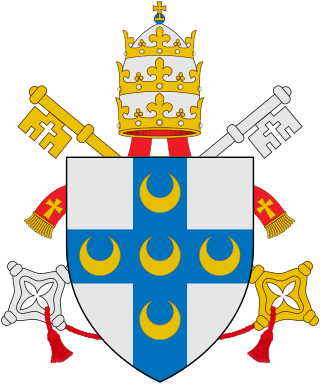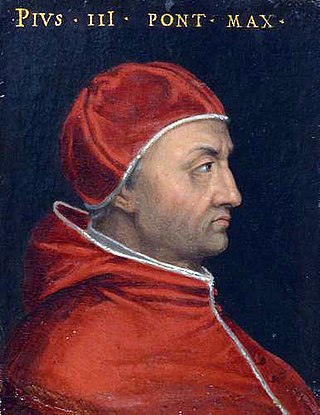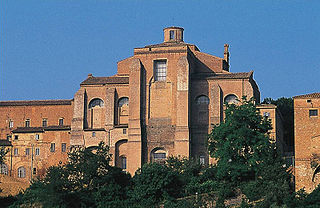
Pope Pius II, born Enea Silvio Bartolomeo Piccolomini, was an author and head of the Catholic Church and ruler of the Papal States from 19 August 1458 to his death, in August 1464. He was born at Corsignano in the Sienese territory of a noble but impoverished family.

Pope Pius III, born Francesco Todeschini, was head of the Catholic Church and ruler of the Papal States from 22 September 1503 to his death. At just twenty-six days, he had one of the shortest pontificates in papal history.

Antonio Gamberelli (1427–1479), nicknamed Antonio Rossellino for the colour of his hair, was an Italian Renaissance sculptor. His older brother, from whom he received his formal training, was the sculptor and architect Bernardo Rossellino.

Pienza is a town and comune in the province of Siena, Tuscany, in the historical region of Val d'Orcia. Situated between the towns of Montepulciano and Montalcino, it is considered the "touchstone of Renaissance urbanism".

Piccolomini is the name of an Italian noble family, Patricians of Siena, who were prominent from the beginning of the 13th century until the 18th century. The family achieved the recognized titles of Pope of the Catholic Church, Prince of the Holy Roman Empire, Grandee of Spain, and Duke of Amalfi. The family is also featured in Florentine Histories, a book written by Niccolò Machiavelli, where he describes the reign of Pope Pius II, who had allied himself with the Venetians and Prince Vlad Dracula, to wage a war against the Sultan of the Ottoman empire.

Alessandro Piccolomini was an Italian humanist, astronomer and philosopher from Siena, who promoted the popularization in the vernacular of Latin and Greek scientific and philosophical treatises. His early works include Il Dialogo della bella creanza delle donne, o Raffaella (1539) and the comedies Amor costante, and Alessandro, which were sponsored and produced by the Sienese Accademia degli Intronati, of which he was a member and an official. Much of his literary production consisted of translations from the Classics, of which Book XIII of Ovid's Metamorphoses and book VI of the Aeneid are early examples. In 1540, while a student at the University of Padua, he helped found the Infiammati Academy, in which he gave lectures in philosophy. His poetry, in which he followed the Petrarchan tradition, appeared first in various contemporary collections, and in 1549 he published as a single volume one hundred sonnets titled Cento sonetti. Later in life, he established in his sister-in-law's Villa of Poggiarello of Stigliano, near Siena, where he attended the revision of his previous essays, and where he wrote all his late works, as the translation of Aristotle's Poetics on which he wrote a learned commentary issued in 1575. His interest in Aristotle included the publication of a paraphrase of Aristotle's Rhetoric with commentary. In his Trattato della grandezza della terra e dell'acqua (1558), he opposed the Aristotelean and Ptolemaic opinion that water was more extensive than land.

Capestrano is a comune and small town with 885 inhabitants (2017), in the Province of L'Aquila, Abruzzo, Italy. It is located in the Gran Sasso e Monti della Laga National Park.
Cardinal Piccolomini may refer to:

Sant'Agostino is a Roman Catholic church in Siena, region of Tuscany, Italy.
Enea Silvio Piccolomini was a Sienese nobleman whose lineage included two popes, and who served in the Habsburg army of Leopold I, Holy Roman Emperor. He is known for leading a campaign against the Ottomans in Bosnia, Macedonia and Kosovo in 1689, and for setting on fire Skopje, the present day capital of the Republic of North Macedonia.

The Piccolomini Altarpiece is an architectural and sculptural altarpiece in the left-nave of Siena Cathedral, commissioned by cardinal Francesco Todeschini Piccolomini who expected it to become his tomb. However, he was elected Pope Pius III and buried in the Vatican. It was built between 1481 and 1485 by Andrea Bregno in Carrara marble, with additions in the following decades – these included four niche sculptures produced between 1501 and 1504 by Michelangelo of saints Peter, Augustine, Paul and Gregory. On top of the altar is the Madonna and Child, a sculpture (probably) by Jacopo della Quercia. The central painting of the Madonna is by Paolo di Giovanni Fei and from the late 14th century.
Piccolomini is the name of an Italian noble family, prominent in Siena from the beginning of the 13th century.

The Diocese of Pienza was a Roman Catholic diocese located in the town of Pienza in the province of Siena, in the Val d'Orcia in Tuscany between the towns of Montepulciano and Montalcino. Until 1462, the town was known as Corsignano. It took the name Pienza from its most famous native son, Pope Pius II, who elevated the town to the status of a city (civitas), and established the new diocese. The diocese existed as an independent entity from 1462 to 1772, directly subject to the Holy See (Papacy).
Francesco Piccolomini was a Roman Catholic prelate who served as Bishop of Grosseto (1611–1622).
Ascanio Piccolomini was a Roman Catholic prelate who served as Archbishop of Siena (1588–1597) and Titular Archbishop of Colossae (1579–1588).
Francesco Maria Piccolomini was a Roman Catholic prelate who served as Bishop of Montalcino (1554–1599) and Bishop of Pienza (1563–1599).
Francesco Bandini Piccolomini (1505–1588) was a Roman Catholic prelate who served as Archbishop of Siena (1529–1588).
Agostino Patrizi Piccolomini was a Roman Catholic prelate who served as Bishop of Pienza (1484–1495) and Bishop of Montalcino (1484–1495).

Celio Piccolomini (1609–1681) was a Roman Catholic cardinal.










